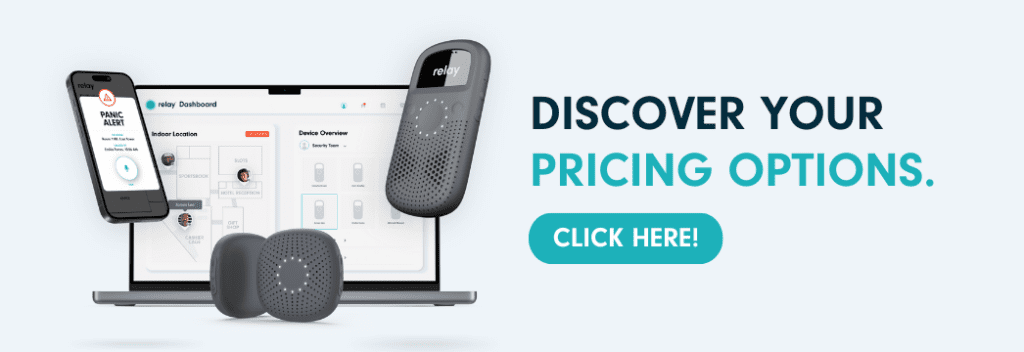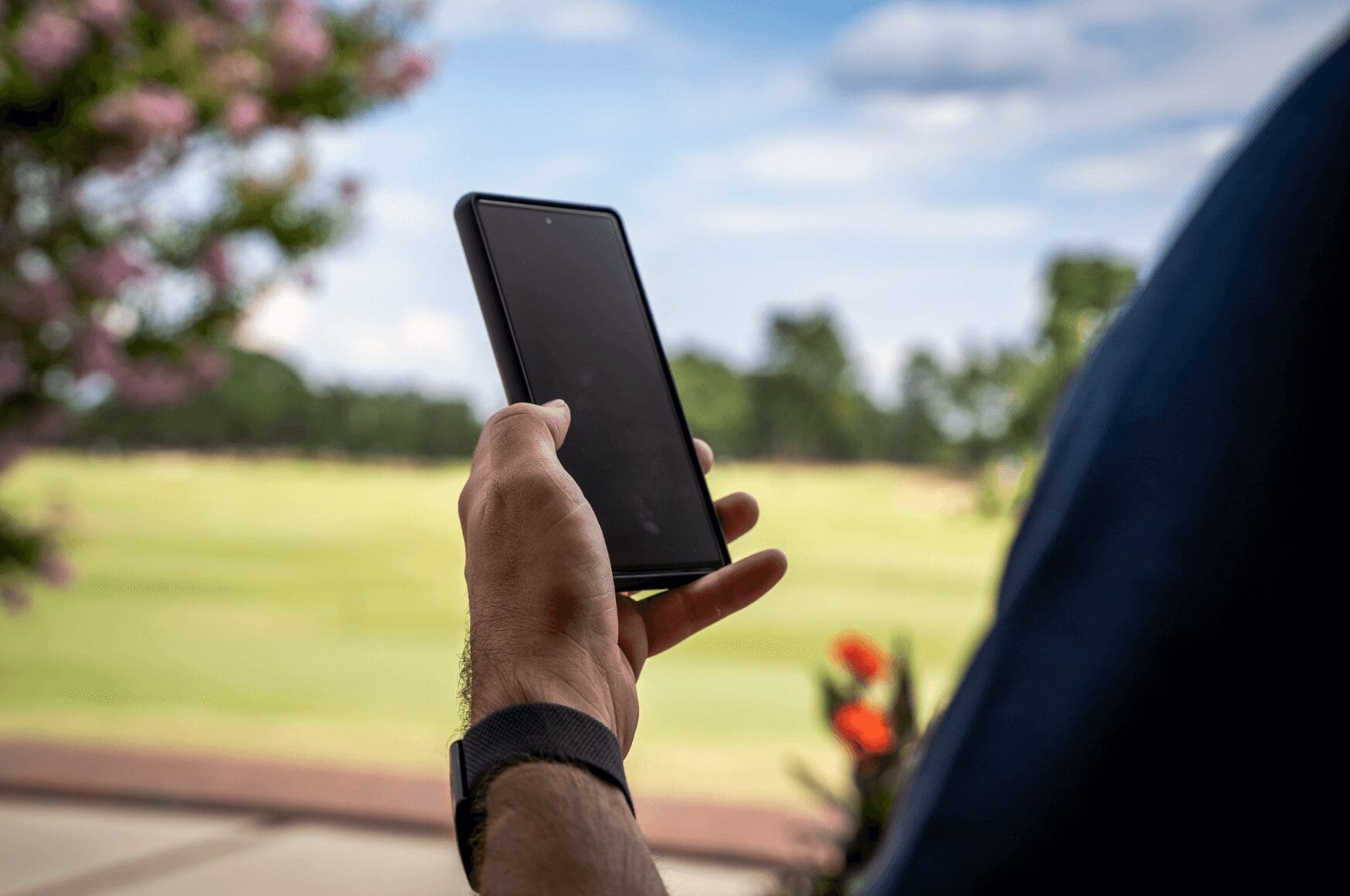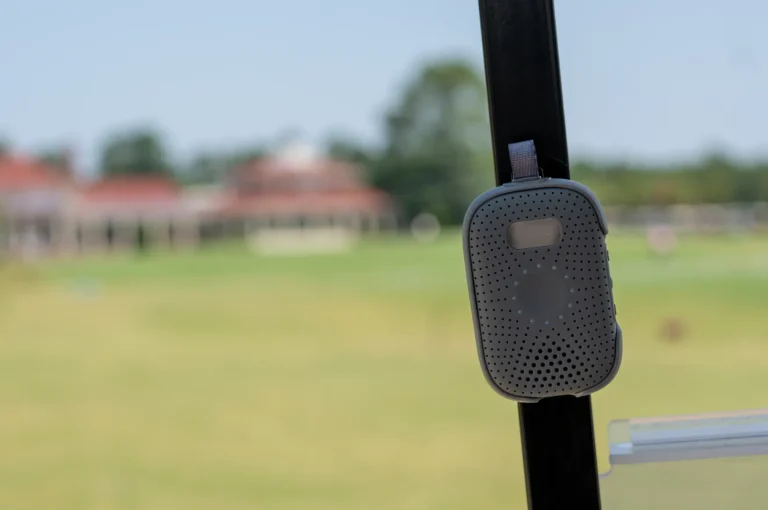When it comes to ensuring staff can communicate effectively at work, companies have three main options: allowing staff to use their personal phones, issuing a company cell with a prepaid service plan, or using a designated workplace communications device (like a smart radio or walkie talkie).
Employees using personal phones for work has its downsides, as does issuing a company-supplied cell phone. Walkie talkies can struggle with range, particularly in large premises or across buildings.
Smart radios are an all-in-one solution, but how can they benefit your business?
In this article, we’ll explore the risks and disadvantages of allowing employees to use company-issued or personal cell phones for work, and the alternative options available (like Relay).
What are the Risks of Using Cell Phones For Work?
Using personal phones for work can seem like a good option for employers. It can be easier and even save money, since employees pay for their own phones and service plans. But there are risks and downsides.
Distracting and Hinder Productivity
When employees are allowed to use their own phones freely during the workday, this can cause a major distraction. Staff may use their phones to text, make personal calls, browse social media, listen to music, and even take pictures/videos in the workplace.
This can hinder productivity and even lead to safety concerns, with employees distracted by their phones rather than paying attention to potential hazards.
Cell phones also aren’t equipped with the audio capabilities smart radios are known for. In loud environments, messages can easily go unheard or be misinterpreted, hindering productivity.
Look Unprofessional
In customer-facing environments, staff using their cell phone – even for legitimate reasons – can look unprofessional and cause unnecessary complaints.
For example, a prestigious hotel employee may simply be organizing a customer request, but to a guest, it looks like they’re making personal calls or texting instead of working.
Unreliable Connectivity
Staff on different networks will have varying coverage and signals. For employers, this means you lose control over how good connectivity is in your workplace. Poor signal can easily decrease productivity and even cause a safety hazard in industrial settings.
Even with company-issued cell phones, these only use one network, which can go down at any time or leave staff experiencing the same deadzones. Communication devices like Relay use all networks plus Wi-Fi, providing enhanced connection.
Risk of Data or Security Breaches
Another downside to staff using personal phones for business is the risk of data or security breaches. Staff can take their cells – and lose them – anywhere. If the phone contains confidential information, this can cause serious problems for a business.
Staff can also unintentionally share confidential information with friends or family by accident, or show people outside of work the communication that happens inside the workplace. This can cause reputational damage or break local privacy laws.
Employee Issues
Allowing staff to use a personal phone for business use can be a problem for employees, too. It can minimize staff privacy and even reduce work-life balance, as they’ll be reachable at all hours.
Even if you issue company cell phones, staff can still use these as their personal devices. This is particularly common if staff are on-call or it’s easier to carry one phone instead of two.
Yet it can leave companies with higher bills to foot (since data and usage may be higher than normal), with employers unable to audit what’s work-related and what isn’t.
Risk of Legal Challenge
Allowing staff to use personal phones at work can leave a business open to legal challenge, particularly if there isn’t a clear policy on personal phone usage.
For example, if employees are left out of pocket from using personal phones for work, they may pursue legal action to gain reimbursement, as seen in California via the Cochran vs. Schwan’s Home Services court case.
Laws and regulations on the issue of cell phone reimbursement vary per state, and your policy regarding personal phone usage should be as robust as necessary.
It’s also important to remember that, even with a cell phone policy, reimbursement costs can be unpredictable, as staff may be on different personal plans with varying surcharges.
What are the Benefits of Relay, a Two-Way Communication Device For Businesses?
Relay is a professional communications solution for businesses, especially in the industrial and hospitality sectors. With smart benefits and protections for workplaces, you can enjoy:
Better Connectivity
Businesses benefit from better and more reliable connectivity when using Relay, leveraging all the major carriers plus Wi-Fi for exceptional service. Whereas company cells only use one network, which isn’t as strong.
With Relay, you can reduce the risk of downtime, signal issues, or deadzones in a workplace, as where one network fails, another network delivers.
Increased Durability and Audio
Despite being lightweight, Relays are designed to withstand heavy impact including drops, kicks, and falls. In industrial settings, like warehouses and building sites, or hospitality settings, it isn’t unheard of to knock, drop, or accidentally damage a company phone.
MIL-STD 810H durable and IP-68 water resistant, RelayX devices are stronger and less likely to break compared to cell phones. This can save a company from the expense of repeatedly replacing company-issued devices, often making Relay more cost-effective for businesses.
Relays are also equipped with better audio capabilities than traditional radios and cell phones. RelayX’s Dual 2.0W loudspeakers deliver an impressive peak loudness of 110dB SPL, ensuring that your messages are heard clearly even in the noisiest environments.
Explore RelayX’s clearer audio, AI-powered language translation, and tough durability in Relay’s video demo center.

Lower Costs
Designed for businesses to communicate at scale, Relay’s smart radios are typically less expensive than cell phones. They also combine multiple features, such as live translation and incident response capabilities, into one tool, which can reduce the need to invest in multiple technologies.
Employees may also abuse company cells by using them personally, which can increase network charges for businesses. Plus, as mentioned above, Relays are more resilient, which can significantly reduce the need to pay for replacement cells.
Work-Enhancing Features
Alongside enabling fast, clear communication between employees – even those in different buildings nationwide – Relays are designed to improve productivity in the workplace, with features including:
- Group communication and push-to-talk
- Reliable, nationwide range
- Live translation of 30+ languages (to remove language barriers and improve communication between employees)
- Make phone calls between devices
- Utilize GPS and Bluetooth to locate people and things
- A built-in panic button, enabling employees to discreetly call for help in an emergency or dangerous situation
- A Relay App and , enabling management to use Relay features and communicate with employees, without having a device themselves
Learn how to use Relay during emergency evacuations here.
Professional Appearance
Relay is the modern solution to walkie-talkies. Even though cell phones can enable two-way communication, workplace radios look more professional – which can be a particularly attractive feature for luxury businesses and customer-facing settings.
Reduces Data, Privacy, and Employee concerns
When you opt for a professional workplace communication device like Relay, staff can’t download social media or use the device for personal reasons.
Instead, all workplace communication can take place via Relay devices. This may prevent the risk of employee issues that may occur with cell phones.
FAQs
What are the Best Cell Phone Walkie Talkies For Work?
Relay is a durable two-way communications device that enables private and group conversation, bridging the gap between individuals, teams, and organizations.
The Relay platform allows teams to talk nationwide (using multiple 4G LTE networks and WiFi), make 1:1 calls, and translate conversations in real time across other Relay devices, including the Relay App on a cell phone.
This can improve productivity, team performance, customer service, and safety in the workplace.
What are the Disadvantages of Using Cell Phones For Work?
Company-funded phones or employee phone stipends can be expensive, particularly when compared to a smart radio system (like Relay).
Cell phones also aren’t as durable, which can increase expenditure in industrial settings, since cell phones can easily be dropped, smashed, or cracked.
Additionally, cell phones have apps that can be used for personal use, such as social media platforms, which can be distracting for employees.
Access Relay’s Pricing Today
Ready to transform your workplace communications? With the right technology partner, your business can experience:
- A boost in productivity
- Quicker decision-making
- Enhanced problem solving
- Increased collaboration and engagement among workers
- Reduced turnover
- Better customer relations
- Easier management
- …and more
Request pricing today.

Not quite ready? Discover how Relay can synchronize teams, increase productivity, and improve efficiency for your business in our video demo center.






